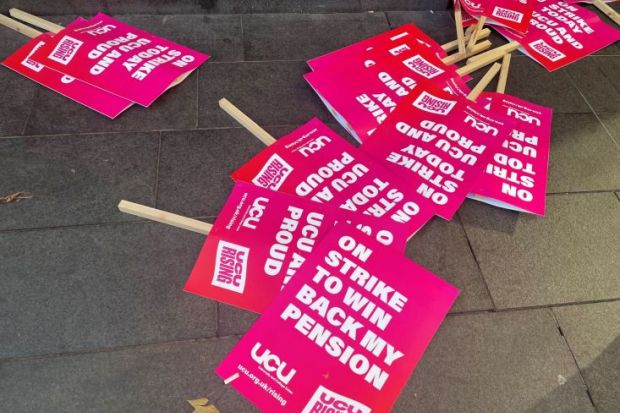Strike action planned at UK universities has been suspended for at least the next two weeks after all sides reported significant progress in the long-running disputes over pay, pensions and working conditions.
Some staff looked set to receive increased pension benefits, and unions said they had secured commitments on the phasing-out of zero-hours contracts, but pay is unlikely to rise beyond the employers’ latest offer, except for those on the lowest wages.
It means that seven of the remaining 12 days of strikes will not go ahead, covering the period 21 February until 2 March. Action planned for later next month might still take place, and the University and College Union (UCU) has confirmed that it still intends to ballot members to secure a six-month extension of its mandate, should it be needed.
Jo Grady, the UCU general secretary, said the strikes had been called off to allow for a “period of calm” while the union holds “intensive negotiations” with employers to secure a final agreement.
Perhaps most significantly, the union claimed that the Universities and Colleges Employers Association (Ucea) has agreed to consult its members “with a recommendation that they give them a mandate to end the use of involuntary zero-hour contracts on campus”.
The union also reported that “we have made progress on pay with the removal of the lowest point from the pay scale, and a review of the pay spine that will benefit everyone”.
But Ucea’s final offer of between 5 and 8 per cent wage rises for staff covered by the negotiations is unlikely to go any higher. In a statement, the body said that a “pay impasse, rather than an agreement, has been reached” and that it regards the negotiations as “complete”.
The Advisory, Conciliation and Arbitration Service (Acas) will continue to oversee the next phase of talks, which will involve discussions on contract types, workloads and pay gaps, Ucea said.
“While the impact of strike action continues to be low and isolated, this is about a final attempt from employers and trade unions to achieve an outcome upon which both parties can consult their members,” Ucea’s chief executive, Raj Jethwa, said.
At the same time, there has been significant movement in the Universities Superannuation Scheme (USS) pensions dispute, which was prompted by a March 2020 valuation that heralded cuts to members’ benefits. Sixty-seven of the 150 universities being affected by industrial action have members striking because of changes to the scheme.
A monitoring report released by the USS has confirmed the improving financial picture that has been seen since the valuation. A deficit of £14.1 billion is now estimated to be a surplus of £5 billion.
If this is confirmed in the coming March 2023 full valuation, Bill Galvin, group chief executive, told stakeholders in an update that they “might want to plan…on the basis that the overall contribution rate required for the current level of benefits is unlikely to be in excess of 20 per cent of payroll”.
He further hinted that pensions benefits comparable to the structure in place before the April 2022 changes could be reintroduced without increased costs for staff or their employers.
“Similarly, they might also want to plan on the basis that the rate that would be required for the pre-1 April 2022 benefit structure going forward is unlikely to be in excess of the current cost of future service (25.2 per cent),” Mr Galvin writes.
In a joint statement reacting to the news, Universities UK – which represents USS employers – and the UCU said the latest information “suggests that the forthcoming 2023 valuation is likely to reveal a high probability of being able to improve benefits and reduce contributions”.
“Should this be confirmed, this would allow for a return to a comparable level of future benefits as existed before the April 2022 changes, as well as achieve a reduction in costs for members and employers. We jointly agree to prioritise the improvement of benefits in this way, where this can be done in a demonstrably sustainable manner.”
Both sides committed to working together to ensure that future valuations are less fraught. The statement said the process should be “undertaken on a moderately prudent and evidence-based basis, taking account of the open and long-term nature of the scheme”.
“We will explore together a long-term solution for managing risk which can provide more stable and sustainable defined benefits and contributions, whilst protecting scheme members’ long-term interests, and so that we do not return to dispute at each valuation.”
Register to continue
Why register?
- Registration is free and only takes a moment
- Once registered, you can read 3 articles a month
- Sign up for our newsletter
Subscribe
Or subscribe for unlimited access to:
- Unlimited access to news, views, insights & reviews
- Digital editions
- Digital access to THE’s university and college rankings analysis
Already registered or a current subscriber? Login







